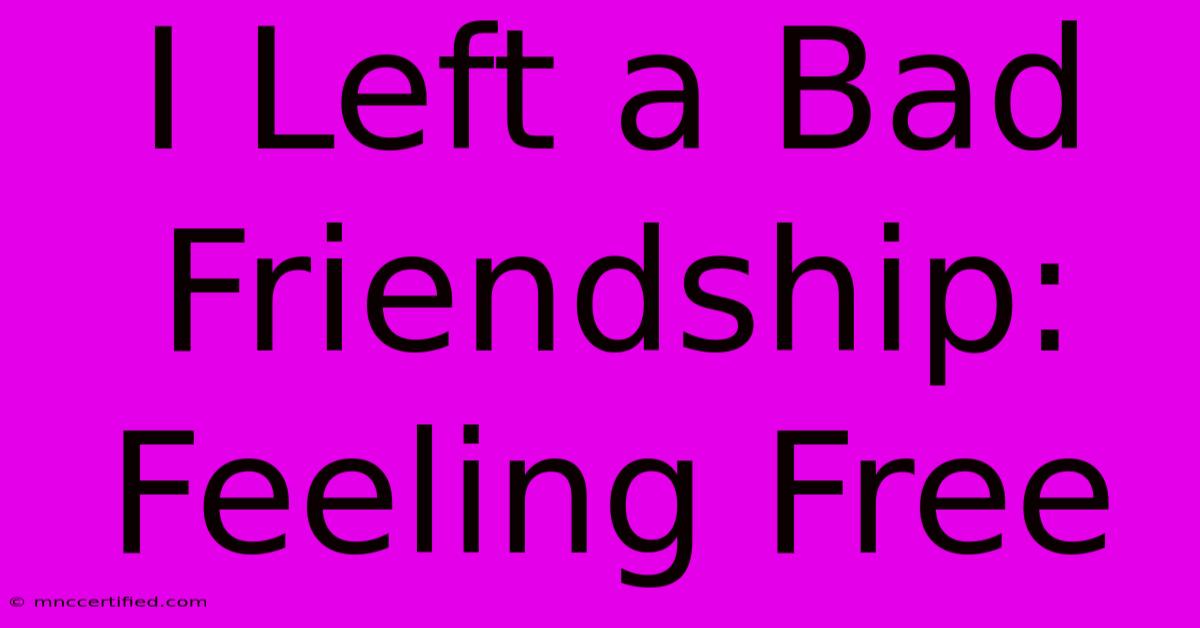I Left A Bad Friendship: Feeling Free

Table of Contents
I Left a Bad Friendship: Feeling Free and Finding Yourself
Leaving a bad friendship can feel like a monumental decision, a weight lifted, and a breath of fresh air. It's a process that deserves acknowledgment and celebration. This article explores the emotions surrounding ending a toxic friendship, the freedom that follows, and how to navigate the transition to a healthier, happier you.
The Weight of a Toxic Friendship
Toxic friendships often go unnoticed until the damage is done. Signs can include constant negativity, one-sidedness, manipulation, betrayal, or a feeling of being constantly drained. You might find yourself walking on eggshells, constantly apologizing, or feeling inadequate. Recognizing these signs is the first crucial step towards freedom.
Identifying the Toxicity: Key Warning Signs
- Constant negativity and criticism: Do they constantly complain, criticize you or others, or bring you down?
- One-sided relationship: Do you always give more than you receive? Is the friendship emotionally draining?
- Manipulation and control: Do they try to control your actions, decisions, or relationships?
- Betrayal of trust: Have they broken your confidence or acted in a way that violates your trust?
- Feeling drained and unhappy: Do you consistently feel anxious, stressed, or unhappy after interacting with them?
If you resonate with several of these points, it's a strong indication that your friendship is toxic and needs to end.
The Liberation of Letting Go
Breaking free from a toxic friendship is a powerful act of self-love. It’s about prioritizing your mental and emotional well-being. The initial feelings might be complex—relief mixed with guilt, sadness, or even fear. This is normal. Allow yourself to feel these emotions without judgment.
Embracing the Freedom: What to Expect
- Increased energy and positivity: You'll likely notice a significant boost in your mood and energy levels.
- Improved self-esteem: Free from the negativity and manipulation, your self-worth can begin to flourish.
- More time and space for yourself: You'll gain valuable time to pursue your passions and nurture your relationships with healthier individuals.
- Stronger sense of self: Stepping away allows you to rediscover who you are outside the context of the toxic friendship.
Moving Forward: Building a Healthy Social Circle
After leaving a bad friendship, it's natural to feel a void. This is an opportunity to cultivate healthier relationships.
Cultivating Healthy Friendships: Tips for Success
- Prioritize quality over quantity: Focus on building meaningful connections with people who support, respect, and uplift you.
- Be selective: Choose friends who share your values and bring positivity into your life.
- Set boundaries: Learn to communicate your needs and boundaries clearly and assertively.
- Join groups and activities: Engage in activities that align with your interests to meet like-minded individuals.
- Nurture existing healthy relationships: Invest time and energy in your supportive friends and family.
Self-Care is Key
The process of leaving a toxic friendship and rebuilding your social circle requires self-care. This means prioritizing your physical, mental, and emotional well-being.
Prioritizing Self-Care: Essential Practices
- Engage in activities you enjoy: Make time for hobbies, passions, and activities that bring you joy.
- Practice mindfulness and meditation: These techniques can help manage stress and anxiety.
- Exercise regularly: Physical activity releases endorphins and improves mood.
- Seek professional support: If you're struggling, consider talking to a therapist or counselor.
Leaving a bad friendship is a brave and important step towards a happier and healthier life. Embrace the freedom, nurture yourself, and build a social circle that supports your growth and well-being. Remember, you deserve to be surrounded by positive and uplifting people. You've taken a significant step towards self-improvement; continue to celebrate your strength and resilience.

Thank you for visiting our website wich cover about I Left A Bad Friendship: Feeling Free. We hope the information provided has been useful to you. Feel free to contact us if you have any questions or need further assistance. See you next time and dont miss to bookmark.
Featured Posts
-
Pdc Darts 2025 Humphries Results
Dec 29, 2024
-
Will Smiths Co Star On Set Intensity
Dec 29, 2024
-
Jeju Air Crash Muan Airport Disaster
Dec 29, 2024
-
Bad Boys Co Star On Smiths Persona
Dec 29, 2024
-
Watch Chargers Vs Patriots Game
Dec 29, 2024